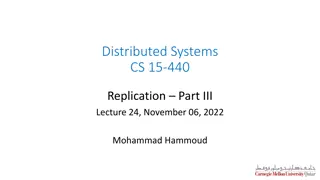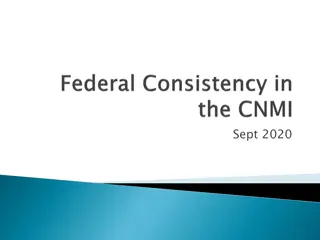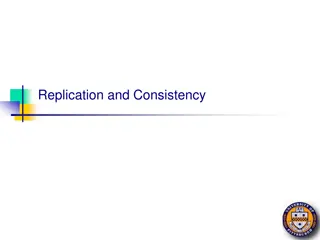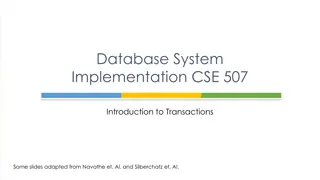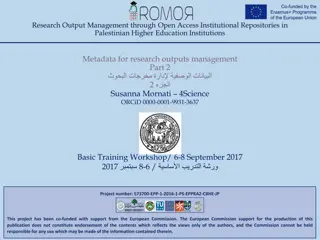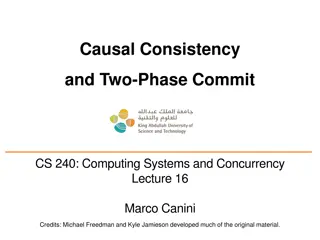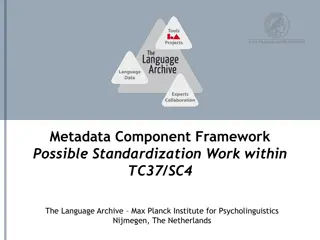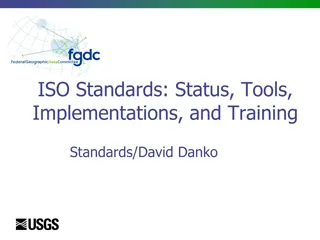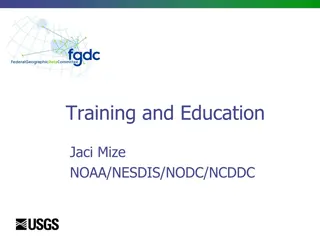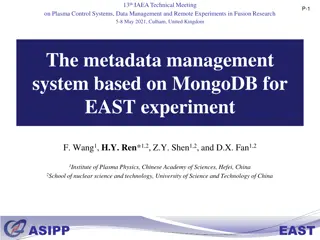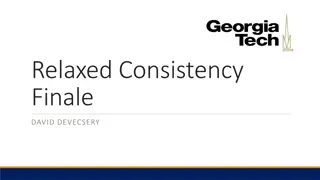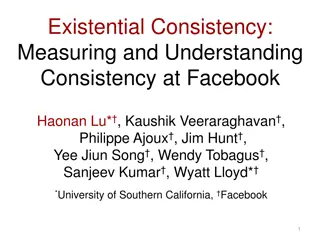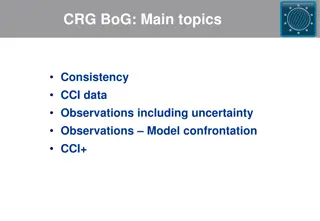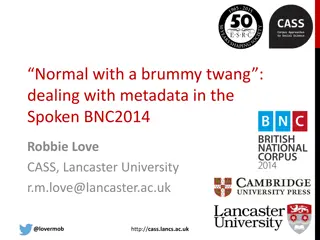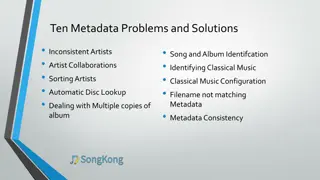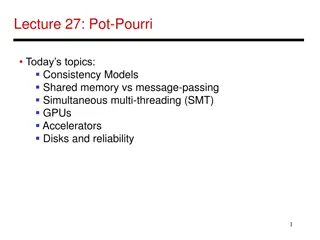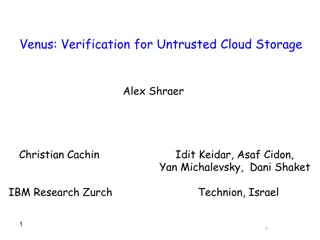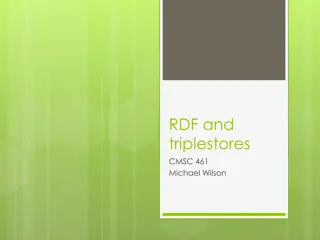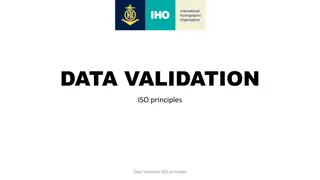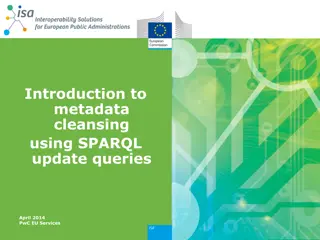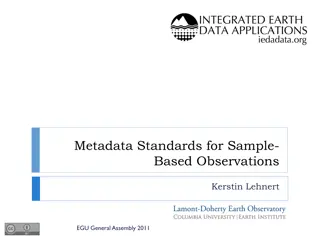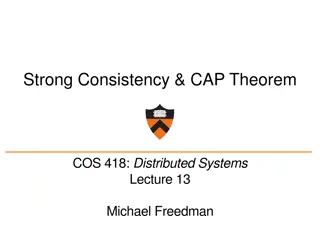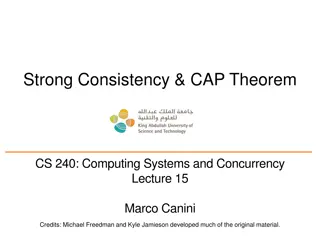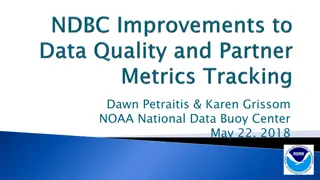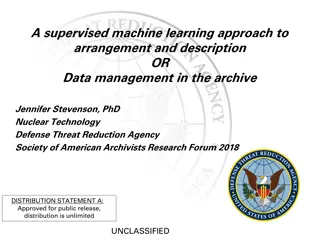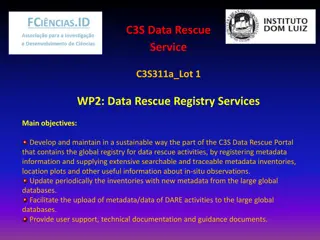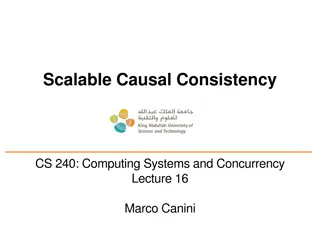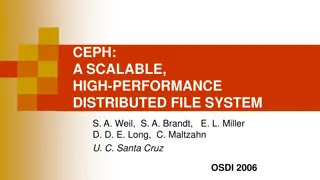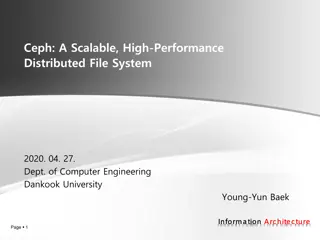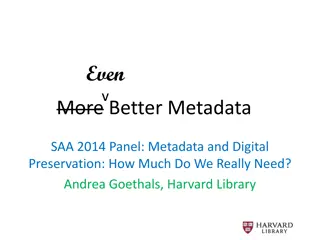Managing File System Consistency in Operating Systems
File systems in operating systems face challenges with crash consistency, especially during write operations. Issues arise when modified data in cache is lost due to system crashes or when data structure invariants are violated. Solutions like write-through and write-back caches help mitigate these
6 views • 14 slides
Understanding Consistency Protocols in Distributed Systems
Today's lecture covers consistency protocols in distributed systems, focusing on primary-based protocols and replicated-write protocols. These protocols play a crucial role in ensuring consistency across multiple replicas. One example discussed is the Remote-Write Protocol, which enforces strict con
0 views • 35 slides
ISBD Manifestation Granularity and Prescription in ISBDM
The ISBD Subgroup on Prescription and Granularity, presented in the IFLA webinar, focuses on developing specific aspects of the draft ISBD for Manifestation. This group aims to maintain a prescriptive approach to maximize consistency, re-usability, local utility, and global interoperability. The dis
0 views • 9 slides
Understanding Federal Consistency in Coastal Zone Management
This presentation serves as an introduction to Federal Consistency in the context of Coastal Zone Management, emphasizing the importance of compliance with enforceable policies outlined in the Coastal Zone Management Act. It highlights the role of the Division of Coastal Resources Management (DCRM)
1 views • 13 slides
Understanding Replication and Consistency in Computer Systems
Explore the concepts of replication and consistency in computer systems, discussing the benefits and challenges of using replicas for reliability, performance, and scalability. Learn about object replication problems and solutions, and the importance of maintaining consistency in shared data access.
1 views • 26 slides
Understanding Properties of Database Transactions
Database transactions play a crucial role in ensuring data integrity and consistency within a database system. This content explores the fundamental properties of transactions, such as atomicity, durability, consistency, and isolation. It delves into the requirements and implications of each propert
2 views • 44 slides
Research Output Management in Higher Education: Metadata and FAIR Principles
Research in higher education focuses on metadata and FAIR principles for effective research output management. The content discusses the challenges related to metadata standardization and the importance of data findability, accessibility, interoperability, and reusability in scientific data manageme
0 views • 22 slides
Understanding Causal Consistency in Distributed Systems
This content covers the concept of causal consistency in computing systems, exploring consistency models such as Causal Linearizability and Eventual Sequential. It explains the importance of logical clocks like Lamport and vector clocks, and how they ensure order in distributed systems. The concept
0 views • 35 slides
Standardization Process for Metadata Components in Language Archives
The standardization process for metadata components within TC37/SC4 at the Language Archive Max Planck Institute involves analyzing existing metadata sets, seeking input from the CLARIN EU community, and determining the next steps for standardization. The process includes forming submission groups,
0 views • 23 slides
Comparison of Metadata Standards: FGDC, ISO, and NAP
Explore the differences and commonalities between the Federal Geographic Data Committee (FGDC), International Organization for Standardization (ISO), and North American Profile (NAP) metadata standards. Discover the evolution, mandatory elements, code lists, and focus areas in these standards to bet
0 views • 14 slides
Comprehensive Training and Education Resources for Metadata Standards
Explore a wealth of training resources including workshops, guidance documents, ISO workbooks, and online lessons related to metadata standards. Access tools, best practices, and guidance for transitioning to international metadata standards like ISO. Learn from presentations, modules, and other tra
0 views • 9 slides
Scalable Causal Consistency for Wide-Area Storage with COPS
This paper delves into the importance of scalable causal consistency for wide-area storage with the COPS system. It explores desired properties such as availability, low latency, partition tolerance, and scalability within data centers. The document discusses the challenges of achieving consistency
0 views • 41 slides
Metadata Management System for Fusion Research Experiment Data
The metadata management system based on MongoDB for the EAST experiment addresses the challenges posed by the increasing size and complexity of experimental data. With a focus on resource organization and user accessibility, this system streamlines data management, enabling quick insights into the v
0 views • 15 slides
Understanding Standard Metadata, Counters, and Meters in P4 Programmable Data Planes
Learn about the role of metadata in packet processing, the significance of intrinsic metadata, and how to utilize custom headers for monitoring switch queues in P4 programmable data planes. This tutorial explores the V1 Model standard metadata and provides hands-on experience in defining and using c
0 views • 21 slides
Memory Consistency Models and Sequential Consistency in Computer Architecture
Memory consistency models play a crucial role in ensuring proper synchronization and ordering of memory references in computer systems. Sequential consistency, introduced by Lamport in 1979, treats processors as interleaved processes on a shared CPU and requires all references to fit into a global o
1 views • 64 slides
Discussions on Programmers' Needs, Memory Models, and Consistency in Software Development
Today's discussions covered various topics including what programmers require, the debate on defining memory models for achieving Sequential Consistency (SC), considerations for data-race-free programs, and the performance trade-offs of weaker memory architectures. Insights into partial and relaxed
2 views • 22 slides
Understanding Consistency at Facebook: A Study on Existential Consistency
This study explores the measurement and comprehension of consistency at Facebook, focusing on existential consistency. Key topics covered include consistency performance, fundamental tension between consistency and performance, anomalies in Facebook systems, and strategies for quantifying and preven
0 views • 30 slides
Ensuring Consistency and Addressing Data Issues in Climate Change Observations
This content delves into the efforts to maintain consistency among different essential climate variables and related datasets. It discusses interactions with the CCI Data Portal and Toolbox projects, as well as challenges such as data gaps, uncertainty descriptions, and issues with data formats. Str
0 views • 9 slides
Dealing with Metadata in the Spoken BNC2014: An Insightful Study
Delving into the metadata of the Spoken BNC2014, this study by Robbie Love at Lancaster University focuses on regional categorization, socio-economic status, and advancements towards dual compatibility with the BNC1994. With over 800 hours of recordings and nearly 700 unique speakers contributing to
0 views • 39 slides
Metadata Challenges and Solutions in Music Management
Addressing ten metadata issues in music organization, such as inconsistent artist attributions and sorting discrepancies, with corresponding solutions including entity-based approaches and artist collaboration management. Strategies for improving metadata consistency and optimizing music data retrie
0 views • 30 slides
Understanding Memory Consistency Models and Communication Paradigms in Computer Systems
Memory consistency models define the ordering of writes and reads in computer systems. Coherence ensures write propagation and serialization, while consistency models guide programmers in writing correct programs. Shared-memory and message-passing are two communication paradigms with different appro
0 views • 31 slides
MarcEdit - Comprehensive Metadata Management Tool
MarcEdit is a versatile metadata management tool created by Terry Reese in 1999. Originally designed for MARC records, it has evolved to support various types of data. Key features include MARC editing tools, RDA helper, regular expressions support, task management, and more. Its robust functionalit
0 views • 16 slides
Ensuring Integrity and Consistency in Remote Storage Systems
Venus project aims to address trust issues in cloud storage by guaranteeing integrity and consistency to users even in the presence of faults. It explores strong consistency requirements, challenges in achieving it, and proposes solutions like fork linearizability to handle faulty servers effectivel
0 views • 18 slides
Understanding the CAP Theorem and Database Consistency
Exploring the CAP Theorem introduced by Eric Brewer, the concept of Basic ACID semantics in databases, the importance of consistency, and examples elucidating atomic writes and sequential consistency in multi-process execution.
0 views • 22 slides
Understanding Metadata and RDF in Data Management
Explore the significance of metadata in data management, the use of RDF and triple stores in organizing data, different reasoning methods available, and the importance of metadata structures. Learn how schemas in RDF allow for easy integration of diverse data types without requiring database reorgan
0 views • 18 slides
Principles of Data Validation and Quality Evaluation According to ISO Standards
Explore the key principles of data validation and quality evaluation as outlined by ISO standards. The content covers the importance of logical consistency, format consistency, and the ordering of data quality evaluation process. It delves into the assessment of data completeness, accuracy, and suit
0 views • 26 slides
Metadata Cleansing Using SPARQL Update Queries
Learn how to transform and cleanse RDF metadata using SPARQL Update queries to conform to the ADMS-AP for Joinup. This tutorial provides essential knowledge on converting metadata for interoperability solutions and the main queries involved. Discover how to ensure your metadata is compliant and read
0 views • 37 slides
Metadata Standards for Sample-Based Observations
Exploring the importance of metadata standards for sample-based observations, this comprehensive guide covers various aspects such as soil sampling, legacy repositories, policies, and best practices. Learn about the role of metadata in discovering, accessing, and preserving samples for long-term sha
0 views • 28 slides
Understanding Strong Consistency and CAP Theorem in Distributed Systems
Strong consistency and the CAP theorem play a crucial role in the design and implementation of distributed systems. This content explores different consistency models such as 2PC, consensus, eventual consistency, Paxos, and Raft, highlighting the importance of maintaining ordering and fault-toleranc
0 views • 29 slides
Understanding Strong Consistency and CAP Theorem
Explore the concepts of strong consistency, CAP theorem, and various consistency models such as 2PC, consensus, eventual consistency, Paxos, Raft, and Dynamo. Learn about fault-tolerance, durability, and the importance of correct consistency models in distributed systems. Understand how Paxos and Ra
0 views • 29 slides
Enhancing Data Quality: NDBC's Improvement Project
NDBC is undertaking a project to overhaul its quality control processes, algorithms, and station setups to align with technological advancements and support increased observations. The project aims to produce, disseminate, and archive high-quality observations, improve consistency and transparency,
0 views • 12 slides
Supervised Machine Learning for Data Management in Archives
In this study by Jennifer Stevenson, a supervised machine learning approach is proposed for arrangement and description in archives, specifically focusing on the DTRIAC collection which contains a vast amount of historical documents related to nuclear technology. The aim is to expedite the catalogin
1 views • 15 slides
Sustainable Development of C3S Data Rescue Portal
Develop and maintain the C3S Data Rescue Portal with a global registry for data rescue activities, focusing on registering metadata, providing searchable inventories, and supporting DARE activities. The project aims to update inventories, facilitate data uploads, and offer user support and technical
0 views • 20 slides
Developing Dependability and Consistency in Personal Skills: A Comprehensive Guide
Understanding dependability and consistency as essential traits in personal skills is crucial for success in the workplace. This guide explores the meanings of dependability and consistency, their relationship, why they are important, and how to demonstrate them effectively. Students will discover s
0 views • 10 slides
Understanding Causal Consistency in Computing Systems
Explore the concept of Causal Consistency in Computing Systems, covering topics such as consistency hierarchy, Causal+ Consistency, relationships in causal consistency, practical examples, and its implementation within replication systems. Learn how it ensures partial ordering of operations and conv
0 views • 31 slides
Scalable Causal Consistency for Wide-Area Storage with COPS
This paper discusses the implementation of scalable causal consistency in wide-area storage systems using COPS. It delves into the key-value abstraction, wide-area storage capabilities, desired properties such as ALPS, scalability improvements, and the importance of consistency in operations. Variou
0 views • 42 slides
Overview of Ceph Distributed File System
Ceph is a scalable, high-performance distributed file system designed for excellent performance, reliability, and scalability in very large systems. It employs innovative strategies like distributed dynamic metadata management, pseudo-random data distribution, and decoupling data and metadata tasks
0 views • 42 slides
Overview of Ceph: A Scalable Distributed File System
Ceph is a high-performance distributed file system known for its excellent performance, reliability, and scalability. It decouples metadata and data operations, leverages OSD intelligence for complexity distribution, and utilizes adaptive metadata cluster architecture. Ceph ensures the separation of
0 views • 23 slides
Spanner Database Overview
Spanner is a globally distributed database system that offers configurable control, consistent commit timestamps, external consistency, and TrueTime API for handling distributed data. It uses a transaction model with two-phase locking and lock-free reads, providing globally sortable timestamps. The
0 views • 19 slides
Evaluating Metadata Quality for Digital Preservation at Harvard Library
Explore the importance of metadata quality in digital preservation with insights from Harvard Library's experience managing their Digital Repository Service. Discover challenges faced with user-contributed metadata and the necessity for systematic validation and tracking to ensure accurate preservat
0 views • 17 slides

